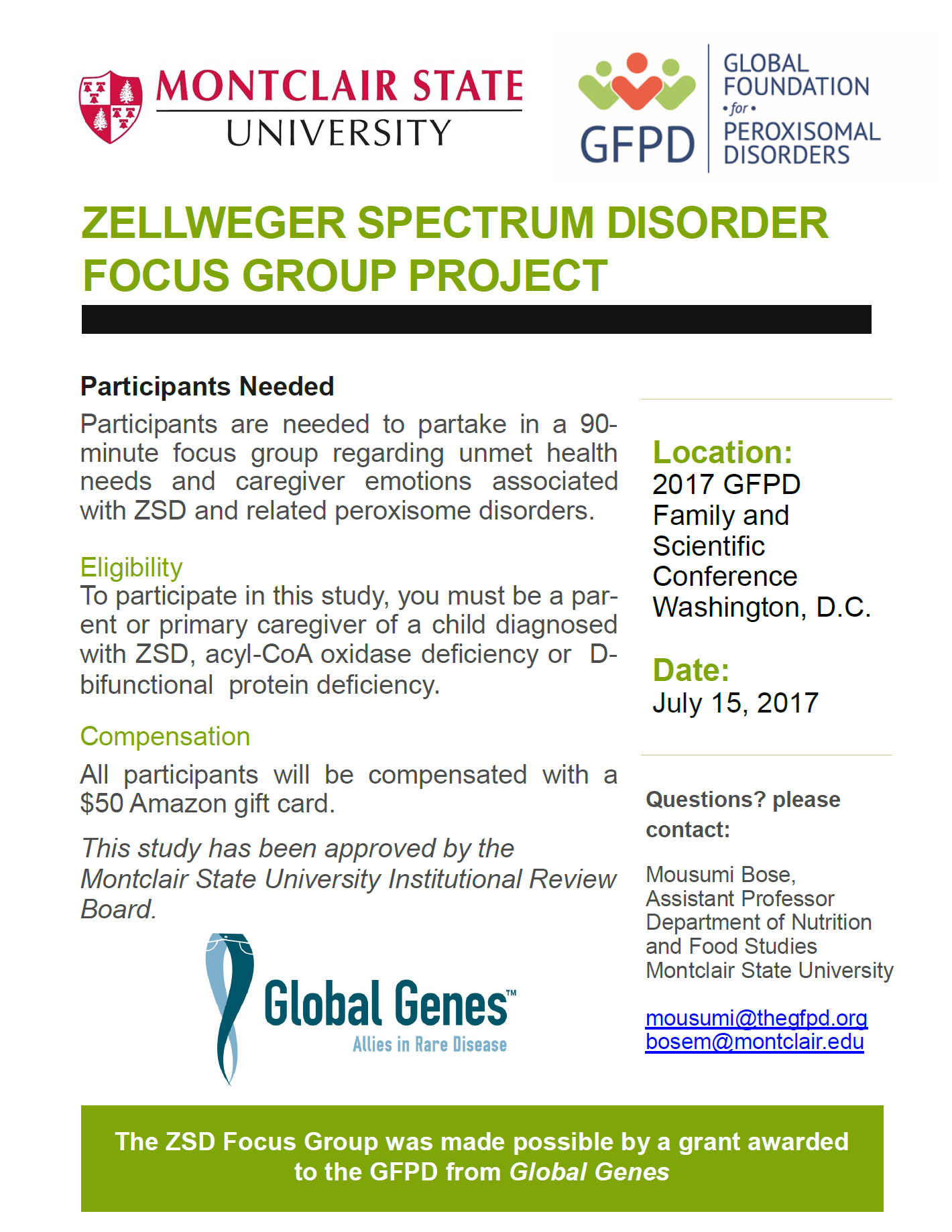The ZSD Focus Group Project
A program coordinated by the Global Foundation for Peroxisomal Disorders and funded by Global Genes

A focus group is a data collection method used in research to obtain pertinent attitudes, perceptions, and opinions on a specific topic. In a public health forum, focus groups are used to help stakeholders (including patients, families, researchers and medical doctors) learn more about community opinions and health needs. This information can be used to help develop specific programs or services targeted to improve the wellbeing of that community in need.
Focus groups are often used in conjunction with other needs assessment methods, like surveys. But needs assessment surveys typically have written, closed-ended, relatively narrow questions which are quantitatively scored. The person being surveyed often responds with a numerical rating, rather than with a verbal statement. Such surveys can be very useful, but they usually can’t capture all that a person is thinking or feeling. Information gained from a focus group may add a level of understanding to community needs that would be otherwise missed in a more “numerical” assessment1.
A focus group may not be appropriate for every area of health research. But focus groups can be useful in situations where action should be guided by community experience, insight, and opinion. In the case of rare diseases such as PBD-ZSD, these elements are crucial in the development of effective treatment, management and care for the disease. Therefore, information gathered from a focus group of PBD-ZSD caregivers will likely be very valuable to the PBD-ZSD community.
Focus groups have previously been conducted among parents and patients in other rare disease communities, including Moebius syndrome, Duchenne muscular dystrophy, certain childhood cancers, and other metabolic disorders similar to PBD-ZSD. The objectives of these focus groups have varied, from supportive care needs to perception of clinical symptoms to quality of life and coping strategies for both patients and caregivers2-6.
The objective of the Zellweger Spectrum Disorder Focus Group Project is to gain a better understanding of 3 major topics among PBD-ZSD caregivers: 1) unmet health needs in PBD-ZSD that are not yet commonly addressed in the medical community 2) quality of life among patients and caregivers affected by PBD-ZSD and 3) the caregiver emotional experience in PBD-ZSD. During the focus group session, a facilitator experienced in leading focus groups will initiate a group discussion among 10-15 PBD-ZSD caregivers. The facilitator will ask open-ended questions related to the described topics to the participants. Participants will be encouraged to speak openly and express their opinions, thoughts and experiences with the topics that are discussed. The session will last about 90 minutes.
The Zellweger Spectrum Disorder Focus Group Project will take place at the 2017 GFPD Family Conference. The information collected from these focus groups will be used to enrich research in the field of PBD-ZSD and ultimately develop resources, programs and services specifically tailored to the needs of the PBD-ZSD community.
1. The Community Toolbox. Chapter 3, Section 6: Conducting Focus Groups. Retrieved from: http://ctb.ku.edu/en/table-of-contents/assessment/assessing-community-needs-and-resources/conduct-focus-groups/main
2. Bendixen RM, Morgenroth LP, Clinard KL. Engaging Participants in Rare Disease Research: A Qualitative Study of Duchenne Muscular Dystrophy. Clin Ther. 2016 Jun;38(6):1474-1484.e2. doi: 10.1016/j.clinthera.2016.04.001.
3. Bogart KR. “People are all about appearances”: A focus group of teenagers with Moebius Syndrome. J Health Psychol. 2015 Dec;20(12):1579-88. doi:
10.1177/1359105313517277
4. Dellenmark-Blom M, Chaplin JE, Jönsson L, Gatzinsky V, Quitmann JH,
Abrahamsson K. Coping strategies used by children and adolescents born with
esophageal atresia – a focus group study obtaining the child and parent
perspective. Child Care Health Dev. 2016 Sep;42(5):759-67. doi:
10.1111/cch.12372.
5. Pelentsov LJ, Fielder AL, Esterman AJ. The Supportive Care Needs of Parents With a Child With a Rare Disease: A Qualitative Descriptive Study. J Pediatr Nurs. 2016 May-Jun;31(3):e207-18. doi: 10.1016/j.pedn.2015.10.022.
6. Zeltner NA, Landolt MA, Baumgartner MR, Lageder S, Quitmann J, Sommer R,
Karall D, Mühlhausen C, Schlune A, Scholl-Bürgi S, Huemer M. Living with
Intoxication-Type Inborn Errors of Metabolism: A Qualitative Analysis of
Interviews with Paediatric Patients and Their Parents. JIMD Rep. 2017;31:1-9.
doi: 10.1007/8904_2016_545.
